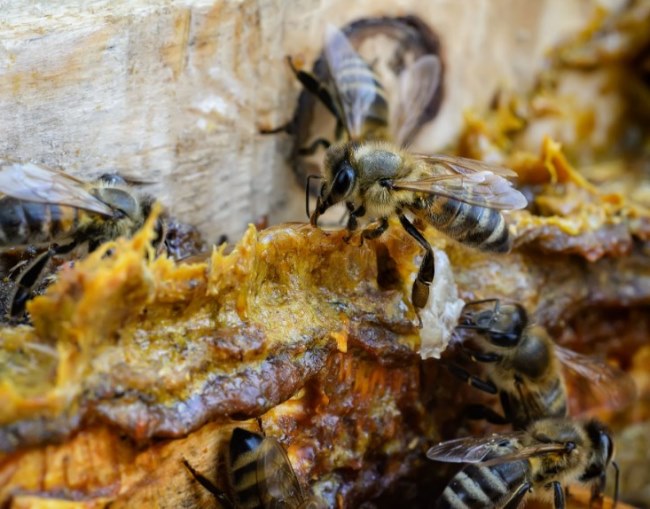A product known as propolis is produced from the sap on needle-leavened trees or evergreens. They make a sticky, greenish-brown paste that is used as a substrate to build their hives when they mix the sap with their own discharges and beeswax. That’s the bee propolis.

As scientists examined further closely into the precise chemical structure of propolis, they discovered that it currently comprises further than 300 natural substances, namely amino acids, coumarins, phenolic aldehydes, polyphenols, sesquiterpene quinones, and steroids. In total, the raw propolis consists of roughly 50% resins, 30% waxes, 10% essential oils, 5% seed, and 5% wheat.
The use of this bee drug is said to date back to the period of Aristotle around 350 B.C. Ancient Egyptians often use propolis in their traditional mummification method. At the same time, ancient Assyrians and Greeks valued it for its wound and tumour healing capability.
-
Propolis’ Antibacterial Effects
Propolis is believed to have antibacterial, antiviral, and anti-inflammatory effects. Yet there is minimal theoretical work on propolis. Researchers are not entirely clear why, but the bee drug seems to have protection against certain pathogens, viruses, and fungi.
-
Wounds
Propolis consists of pinocembrin, which is an antifungal flavonoid. These antimicrobial and anti-inflammatory properties allow propolis to heal wounds. A study showed that propolis could enable people with severe burns to recover more quickly by promoting new healthy cell development.
Another research found that an alcoholic topical propolis extract is more effective than a steroid in reducing mast cells in oral surgery wounds. Inflammation is associated with mast cells and delayed wound healing.
-
Genital Herpes and cold sores
Ointments containing 3% propolis like Herstat or Coldsore-FX can help speed recovery and lessen symptoms both in cold and genital herpes sores.
A study found that when topical propolis was administered three times a day, it enabled to cure cold sores quicker than without treatment. Propolis cream was found not only to reduce the number of herpes viruses in a person’s body but also to defend the body from possible cold outbreaks.
-
Cancer
Propolis has also been proposed to play a part in the treatment of certain cancers. According to the study, the drug has specific anti-cancer effects:
- Keeping the multiplication of cancer cells
- Reducing the probability of cells becoming cancerous
- Obstructing pathways to stop cancer cells from sensing with each other
The study also stated that propolis might be a preventive therapy for cancer and not a specific treatment. Another research showed that the use of Chinese propolis might be useful as a treatment for breast cancer because of its anti-tumour impact on cells of breast cancer.
-
Safety Aspects
There is still little data as to whether propolis is healthy or not, but they are not considered to be high risk. People usually take some propolis once they consume honey. But, when you have an allergy to bees or honey, you will have a reaction to propolis-containing products. Propolis can also trigger its allergic reaction when used for an extended period of time.
Beekeepers are some of the most likely to have propolis reactions because they are too much around the site. An eczema-like skin rash is the standard allergic reaction. Consult your doctor before incorporating propolis with your medication regimen, particularly if you have any asthma or allergies.
In supermarkets or natural food shops, bee propolis can be bought. Topical types contain creams, lotion, and ointments. Propolis can also be administered orally and is available in the shape of a pill, capsule, and liquid extract.
No scientifically prescribed dosage is currently accessible because further work is needed. One research suggests a maximum dosage of around 70 mg/day, although that is not a guideline from the FDA. Consult your doctor if you are healthy with propolis before taking some supplements.
Leave a Reply
You must be logged in to post a comment.